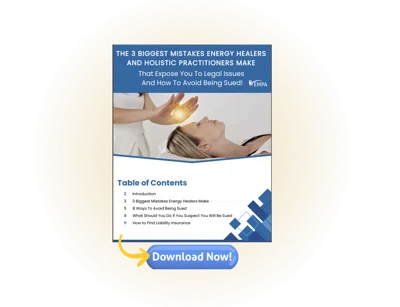Verbal vs. Written Disclaimers: What Protects Your Energy Healing Practice?
September 3rd, 2025
3 min read
By Anya Charles

Have you ever thought, “I always explain everything to my clients out loud—do I really need paperwork?”
Or wondered, “If a client complains, won’t my verbal explanation be enough to cover me?”
Here’s the problem: verbal disclaimers may feel clear in the moment, but they rarely hold up if a client files a complaint. Without something in writing, it becomes your word against theirs—and that leaves your practice vulnerable.
In this article, we’ll explore why written informed consent is the safest way to set expectations, shield your credibility, and give both you and your clients confidence moving forward.
1-3.png?width=226&height=386&name=Hubspot%20pic%20%20(1)1-3.png) Why Verbal Disclaimers May Not Protect Energy Healers from Client Complaints
Why Verbal Disclaimers May Not Protect Energy Healers from Client Complaints
On the surface, a verbal explanation feels simple and natural. You describe what you do, reassure your client, and move into the session. The problem is what happens later—because when there’s a complaint, the first question often comes down to this: what proof exists?
Here’s why verbal disclaimers rarely protect you:
- No record to reference – Without something written or without a witness, there’s nothing concrete to show what expectations were set.
- Client memory fades – Even if you explained everything clearly, clients may forget or remember details differently.
- Investigations look for evidence – If a claim arises, insurers or reviewers will ask to see documentation that supports your side.
Imagine a client leaves your session unhappy. You may recall explaining your scope and limitations, but if it wasn’t captured in writing, there’s no way to confirm what was actually shared. That gap leaves your practice vulnerable—and it’s exactly why relying on verbal disclaimers can backfire.
2-3.png?width=228&height=404&name=Hubspot%20pic%20%20(1)2-3.png) What Written Informed Consent Covers (That Verbal Disclaimers Don’t)
What Written Informed Consent Covers (That Verbal Disclaimers Don’t)
A written informed consent form is a tool that sets the tone for a safe, professional client relationship. Instead of relying on memory or assumptions, both you and your client have a clear reference point for what was explained, what was agreed to, and how the work will be approached.
A strong informed consent document typically includes:
- A description of your scope of practice (what you do and don’t do)
- A reminder that energy healing is not a replacement for medical treatment
- An outline of what clients can expect during a session
- A note that results vary, and no specific outcomes are promised
- Payment and cancellation policies
- Space for the client’s signature and date
Far from creating distance, most clients find this reassuring. It shows that you’re prepared, transparent, and serious about their well-being. That kind of professionalism doesn’t take away from the energy work; it adds a layer of confidence that helps clients feel safe coming back.
3-2.png?width=227&height=397&name=Hubspot%20pic%20%20(1)3-2.png) They Knew What to Expect—Isn’t That Enough?
They Knew What to Expect—Isn’t That Enough?
Let’s clear the air!
“I don’t want to scare clients off with paperwork.”
Clients usually feel the opposite. A simple, friendly form shows you take your work seriously. It sets the tone that you care about client safety and their right to clear information.
“I already explained everything in conversation.”
Verbal communication is part of excellent client care. The challenge is that details get blurred. Think about it, do you remember the fine print for every appointment you make or product you purchase? A written form keeps everyone on the same page and gives you something to reference later if needed.
“Paperwork feels cold or impersonal.”
While there are guidelines, it is your paperwork; so make it your own! Your tone and approach are what make the difference. Walking clients through your consent form in a warm way can deepen trust. They’ll see you as someone who takes their well-being seriously, while still honoring personal connection.
What’s Next: Setting Expectations with Confidence
Verbal disclaimers may feel supportive in the moment, but they can leave gaps that create confusion later. A simple written informed consent form gives both you and your clients a shared understanding of what your sessions involve. It strengthens trust, reinforces your professionalism, and helps prevent small misunderstandings from turning into bigger issues.
If you’re ready to go deeper, download our free guide, The 3 Biggest Mistakes Energy Healers and Holistic Practitioners Make That Expose You to Legal Issues and How to Avoid Being Sued. You’ll learn how challenges with scope of practice, standard of care, and informed consent show up in real-world situations—and the practical steps you can take to avoid them.
With clear expectations in place, you’ll be able to focus fully on your work, knowing your practice is supported and your clients feel safe.
Disclaimer: This article is for educational purposes only and does not provide legal, financial, or medical advice. The examples are general, and coverage may vary by policy. Always refer to your insurance provider or policy language for specific details, as the policy terms take precedence. For legal concerns related to your practice, consult an attorney.
Anya is a writer with a passion for inspiring those around her. She is the Content Manager at EMPA, where she works closely with subject matter experts to turn their insight into articles that inform, support, and empower the energy healing community. With over a decade of experience in the wellness world, she enjoys making complex ideas feel accessible and meaningful. Whether she’s writing new pieces or polishing others, Anya’s focus is on helping others grow their clarity and professionalism. She also serves as Editor in Chief of Energy Magazine, a unique publication dedicated to the world of energy medicine. Outside the office, you’ll find Anya reading, planning travel adventures, or negotiating peace treaties with her houseplants.
Topics:

.png?width=1326&height=405&name=EMPALogo_final_white-01%20(1).png)


























